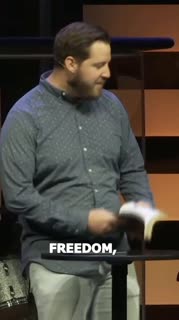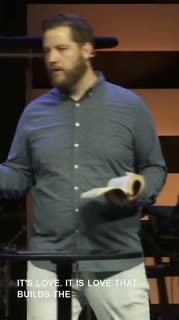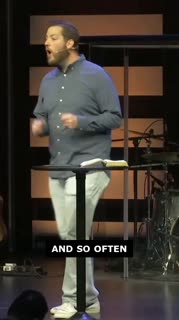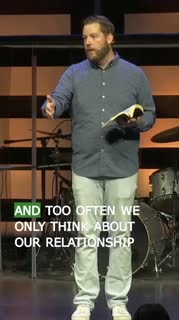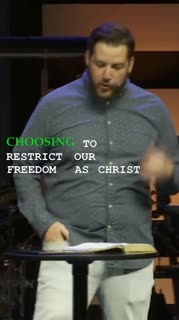Freedom in Christ: Love Over Knowledge
Devotional
Sermon Summary
Bible Study Guide
Sermon Clips
1) "Freedom is an important thing in our lives. It's a good thing. We have freedoms in Christ. You know, when Jesus came and died on the cross for us, we were granted freedom. We were freed from the weight of the law that had been placed on the Jewish people. We became free of our sins. And that there is all of this freedom that we have as followers of Jesus. And today, Paul's going to dive into one kind of section of that. And I really love this chapter, chapter 8, because it kind of sneaks up on you." [21:05] (34 seconds)
2) "It's love. It is love that builds the church. It is love that strengthens each other. That is what's most important here. Let's keep reading. And anyone who claims to know all the answers doesn't really know very much, but the person who loves God is the one whom God recognizes. Anybody who claims to know answers really doesn't know all that much. Now, the camp that has planted themselves in the opinion that it is okay to eat this food, they have really used a logical theology, understanding of God to arrive at their opinion." [25:59] (45 seconds)
3) "There are things in life that are not inherently sinful, yet can lead to sin. And so we have discussions, right, as Christ followers on things like alcohol, gambling, watching certain movies, listening to certain music. These things that are not on their own sin, but absolutely can lead to sin. They can lead to addiction. They can lead to all kinds of issues for us. And we have to recognize that and respond accordingly." [32:06] (43 seconds)
4) "And so often we're not intending to set a trap for a fellow believer. But in reality, that is what we're doing. We're setting a trap for them. We are placing an obstacle in their path that absolutely could cause them to stumble here. Absolutely could cause them to fall. And then he says these few words, right? Four words here that shift all of this from the people that you go to church with, right? Those other people that you see in the lobby or you have to wait behind them in line because they got there like two seconds before you for the cafe and so now you're gonna be late. And those people, it shifts them from that to seeing them in a more proper perspective, right? He ends that section by saying that these people for whom Christ died." [36:26] (55 seconds)
5) "And too often we only think about our relationship with God as just this only vertical relationship, right? It's between me and God. It's between me and God. And am I right with God? I need to be right with God. Vertical. And yes, we do have a vertical relationship, right? Between us and God. But that vertical relationship as played out in the New Testament over and over and over again is supposed to affect all of our horizontal relationships. It's supposed to affect the way that we interact with each other as believers in Jesus. It's supposed to change the way that we would view each other. Not just as other humans, but as brothers and sisters in Jesus." [38:31] (45 seconds)
6) "Choosing to restrict our freedom as Christ followers, it is not easy, but it is Christ-like. It's the very action of taking on human form as a follower of Jesus. Sorry. Sorry. The very act of taking on human form, as Jesus, not a follower of him, just him. That very action is a surrendering of power and freedom that we'll never even fully understand. And then living an entire life ultimately surrendering his freedom, allowing himself to be taken prisoner by some Roman soldiers, knowing fully well that he will be falsely accused, that he will be convicted, that he will be beaten and tortured, and that he will be crucified and die for the sake of others. It is not easy, but it is a lot like Jesus, isn't it?" [47:51] (69 seconds)
Ask a question about this sermon
2) "It's love. It is love that builds the church. It is love that strengthens each other. That is what's most important here. Let's keep reading. And anyone who claims to know all the answers doesn't really know very much, but the person who loves God is the one whom God recognizes. Anybody who claims to know answers really doesn't know all that much. Now, the camp that has planted themselves in the opinion that it is okay to eat this food, they have really used a logical theology, understanding of God to arrive at their opinion." [25:59] (45 seconds)
3) "There are things in life that are not inherently sinful, yet can lead to sin. And so we have discussions, right, as Christ followers on things like alcohol, gambling, watching certain movies, listening to certain music. These things that are not on their own sin, but absolutely can lead to sin. They can lead to addiction. They can lead to all kinds of issues for us. And we have to recognize that and respond accordingly." [32:06] (43 seconds)
4) "And so often we're not intending to set a trap for a fellow believer. But in reality, that is what we're doing. We're setting a trap for them. We are placing an obstacle in their path that absolutely could cause them to stumble here. Absolutely could cause them to fall. And then he says these few words, right? Four words here that shift all of this from the people that you go to church with, right? Those other people that you see in the lobby or you have to wait behind them in line because they got there like two seconds before you for the cafe and so now you're gonna be late. And those people, it shifts them from that to seeing them in a more proper perspective, right? He ends that section by saying that these people for whom Christ died." [36:26] (55 seconds)
5) "And too often we only think about our relationship with God as just this only vertical relationship, right? It's between me and God. It's between me and God. And am I right with God? I need to be right with God. Vertical. And yes, we do have a vertical relationship, right? Between us and God. But that vertical relationship as played out in the New Testament over and over and over again is supposed to affect all of our horizontal relationships. It's supposed to affect the way that we interact with each other as believers in Jesus. It's supposed to change the way that we would view each other. Not just as other humans, but as brothers and sisters in Jesus." [38:31] (45 seconds)
6) "Choosing to restrict our freedom as Christ followers, it is not easy, but it is Christ-like. It's the very action of taking on human form as a follower of Jesus. Sorry. Sorry. The very act of taking on human form, as Jesus, not a follower of him, just him. That very action is a surrendering of power and freedom that we'll never even fully understand. And then living an entire life ultimately surrendering his freedom, allowing himself to be taken prisoner by some Roman soldiers, knowing fully well that he will be falsely accused, that he will be convicted, that he will be beaten and tortured, and that he will be crucified and die for the sake of others. It is not easy, but it is a lot like Jesus, isn't it?" [47:51] (69 seconds)
